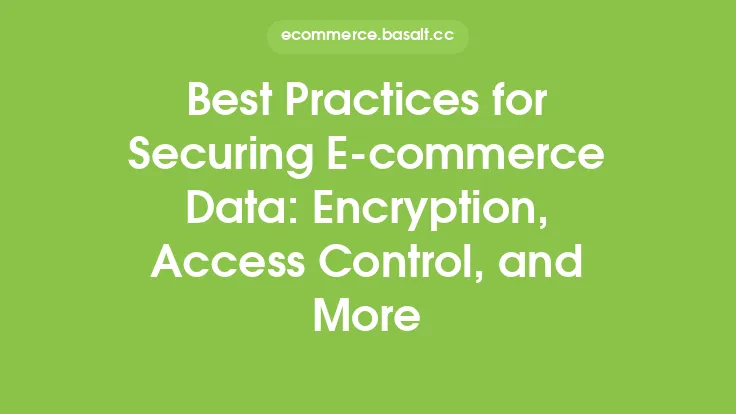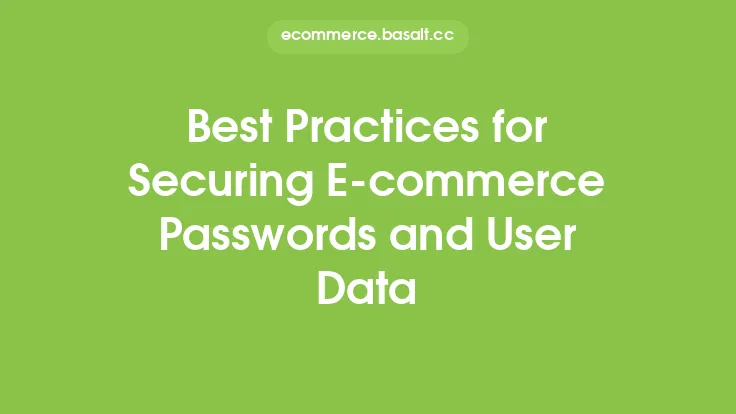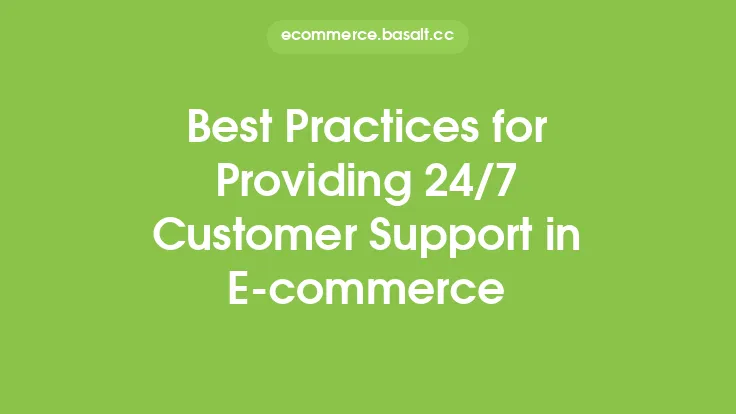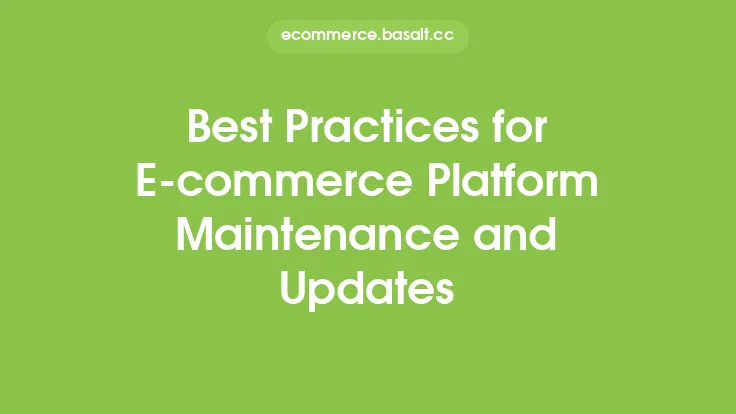As the e-commerce industry continues to grow and evolve, the importance of protecting customer data has become a top priority for online businesses. With the increasing number of cyber threats and data breaches, it's essential for e-commerce companies to implement robust security measures to safeguard sensitive customer information. In this article, we'll discuss the best practices for protecting customer data and provide valuable insights on how to maintain a secure e-commerce environment.
Introduction to E-commerce Security
E-commerce security refers to the measures taken to protect online transactions, customer data, and website integrity from unauthorized access, use, disclosure, disruption, modification, or destruction. This includes protecting against common threats such as hacking, phishing, malware, and denial-of-service (DoS) attacks. A robust e-commerce security strategy involves a combination of technical, administrative, and physical controls to ensure the confidentiality, integrity, and availability of customer data.
Data Encryption and Storage
Data encryption is a critical component of e-commerce security, as it ensures that sensitive customer information, such as credit card numbers and personal identifiable information (PII), is protected from unauthorized access. Online businesses should use industry-standard encryption protocols, such as Transport Layer Security (TLS) and Secure Sockets Layer (SSL), to encrypt data both in transit and at rest. Additionally, e-commerce companies should implement secure data storage practices, such as using secure servers, encrypting data backups, and limiting access to sensitive data.
Access Control and Authentication
Access control and authentication are essential for preventing unauthorized access to customer data and e-commerce systems. Online businesses should implement strong password policies, multi-factor authentication, and role-based access control to ensure that only authorized personnel have access to sensitive data and systems. Additionally, e-commerce companies should regularly review and update access controls to ensure that they are aligned with changing business needs and security requirements.
Network Security
Network security is critical for protecting e-commerce systems and customer data from cyber threats. Online businesses should implement robust network security measures, such as firewalls, intrusion detection and prevention systems, and virtual private networks (VPNs), to prevent unauthorized access and protect against common threats. Additionally, e-commerce companies should regularly monitor network activity, perform vulnerability assessments, and update security patches to ensure that their networks are secure and up-to-date.
Incident Response and Management
Despite best efforts, e-commerce security breaches can still occur. Therefore, it's essential for online businesses to have an incident response and management plan in place to quickly respond to and contain security incidents. This includes establishing an incident response team, developing incident response procedures, and conducting regular training and exercises to ensure that personnel are prepared to respond to security incidents.
Compliance and Regulatory Requirements
E-commerce companies must comply with various regulatory requirements, such as the Payment Card Industry Data Security Standard (PCI DSS), the General Data Protection Regulation (GDPR), and the California Consumer Privacy Act (CCPA), to ensure that they are protecting customer data in accordance with industry standards and regulatory requirements. Online businesses should regularly review and update their compliance programs to ensure that they are aligned with changing regulatory requirements and industry standards.
Employee Education and Awareness
Employee education and awareness are critical for maintaining a secure e-commerce environment. Online businesses should provide regular security training and awareness programs to educate employees on e-commerce security best practices, phishing and social engineering attacks, and the importance of protecting customer data. Additionally, e-commerce companies should establish a security-aware culture, where employees are encouraged to report security incidents and vulnerabilities.
Third-Party Risk Management
E-commerce companies often rely on third-party vendors and service providers to support their online businesses. However, these third-party relationships can also introduce security risks. Online businesses should implement robust third-party risk management practices, such as conducting regular security assessments, monitoring third-party activity, and establishing clear security requirements and expectations.
Continuous Monitoring and Improvement
E-commerce security is an ongoing process that requires continuous monitoring and improvement. Online businesses should regularly monitor their security controls, perform vulnerability assessments, and update security patches to ensure that their e-commerce environment is secure and up-to-date. Additionally, e-commerce companies should establish a culture of continuous improvement, where security incidents and vulnerabilities are used as opportunities to improve and refine security controls.
Conclusion
Protecting customer data is a critical component of e-commerce security, and online businesses must implement robust security measures to safeguard sensitive customer information. By following the best practices outlined in this article, e-commerce companies can maintain a secure e-commerce environment, protect customer data, and build trust with their customers. Remember, e-commerce security is an ongoing process that requires continuous monitoring and improvement, and online businesses must stay vigilant and adapt to changing security threats and regulatory requirements to ensure the long-term success of their online businesses.





